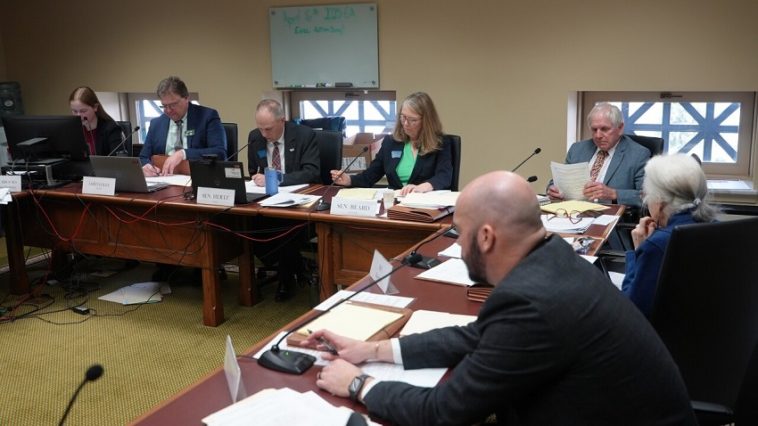Missoula, MT— On Wednesday morning, the Montana Senate Taxation Committee took a significant step in advancing several major tax relief proposals, albeit with notable amendments. The committee, led by Chair Sen. Greg Hertz, R-Polson, met for just over two hours and worked through a dozen bills, some of which would drastically alter the state’s property and income tax structures.
Sen. Hertz, who has expressed a desire to clear the board on tax relief issues, noted that while he had reservations about some of the bills, he wanted to keep the legislative process moving forward. “I’m hoping to clear the board out of here today,” he said. The committee’s actions reflect a growing urgency as lawmakers work to meet critical deadlines before the legislative session’s close.
Property Tax Proposals Move Forward
Among the most significant developments was the movement of House Bill 231, Governor Greg Gianforte’s preferred property tax proposal. Despite concerns over the complexity of the bill, committee members voted to advance it with a series of amendments. The bill, known as the “homestead” bill, seeks to provide lower property tax rates for primary residences, long-term rentals, and smaller commercial properties, while raising rates on properties that do not qualify for those exemptions.
Sen. Hertz, who was not enthusiastic about the bill, nonetheless emphasized the need to allow debate on the Senate floor. “I’m not particularly fond of this bill, but I agreed to help get it out of here, just so we can get it on the floor and have a debate about it,” he said.
One key amendment to HB 231 involves a one-time property tax rebate of up to $400 for residents, as the state might not be able to implement the homestead rates in time for 2025. Additionally, the committee introduced a provision aimed at mitigating potential revenue losses for municipalities such as Billings and Sunburst, which are limited by voter-approved charters on how much property tax they can levy. The amendment would allow these communities to adjust their mill rates temporarily to maintain revenue levels. If this measure is found unconstitutional, the state would step in, offering reimbursements for up to four years from the state general fund.
Meanwhile, House Bill 155, another property tax measure, underwent substantial changes. Initially, the bill proposed a graduated property tax system with seven separate rates based on the value of residential properties. The committee, however, stripped this provision, opting instead for two tax rates: one for homes valued below $1.5 million and another for those above that threshold. The bill now also includes a homestead exemption that would exempt the first $50,000 of a Montanan’s primary residence from taxation.
Income Tax Relief Gains Traction
In addition to property tax reform, the committee moved forward House Bill 337, a major income tax relief proposal. Sponsored by House Speaker Rep. Brandon Ler, R-Savage, the bill would increase the income threshold for the state’s lower tax bracket, reduce the rate for the higher tax bracket, and enhance the earned income tax credit.
The committee, however, rejected Senate Bill 323, which proposed a more aggressive income tax reduction plan supported by Governor Gianforte. Instead, they incorporated a provision into HB 337 to introduce “triggers” that could lower the top tax rate over time if Montana’s state revenues continue to grow. This approach allows for more gradual changes to the tax code while accounting for the state’s budget surplus, largely driven by increased income tax collections.
“I thought it was too fast in two years, and I think triggers make a lot more sense,” Hertz said, emphasizing that the state’s strong financial position warranted caution in reducing taxes too quickly.
While many lawmakers, including Sen. Dave Fern, D-Whitefish, supported the amendment, they also expressed concerns about the long-term impact of further income tax cuts on the state’s budget. “I think that we probably can’t responsibly get to a 4.7% [top income tax rate] – I’ll be blunt – without a sales tax,” Fern said.
Moving Forward
With HB 231, HB 155, and HB 337 all advancing with amendments, the bills now face additional scrutiny. If passed by the Senate, they will return to the House for further consideration. Lawmakers have adjusted their timelines to accommodate these changes, with both chambers voting to push back the transmittal deadline for amended bills until April 25, the 82nd legislative day.
Despite the compromises and concerns over specific provisions, lawmakers made it clear that they want to keep the conversation about property tax and income tax relief moving. “We’ve got to move this bill forward, at least for the optics of it for the state,” said Sen. Fern, acknowledging the need for action even if the bills are far from perfect.
As the legislative session progresses, Montanans can expect further debate and adjustments to these key tax relief proposals, with lawmakers seeking a balance between addressing property tax burdens and ensuring the state’s fiscal stability.



